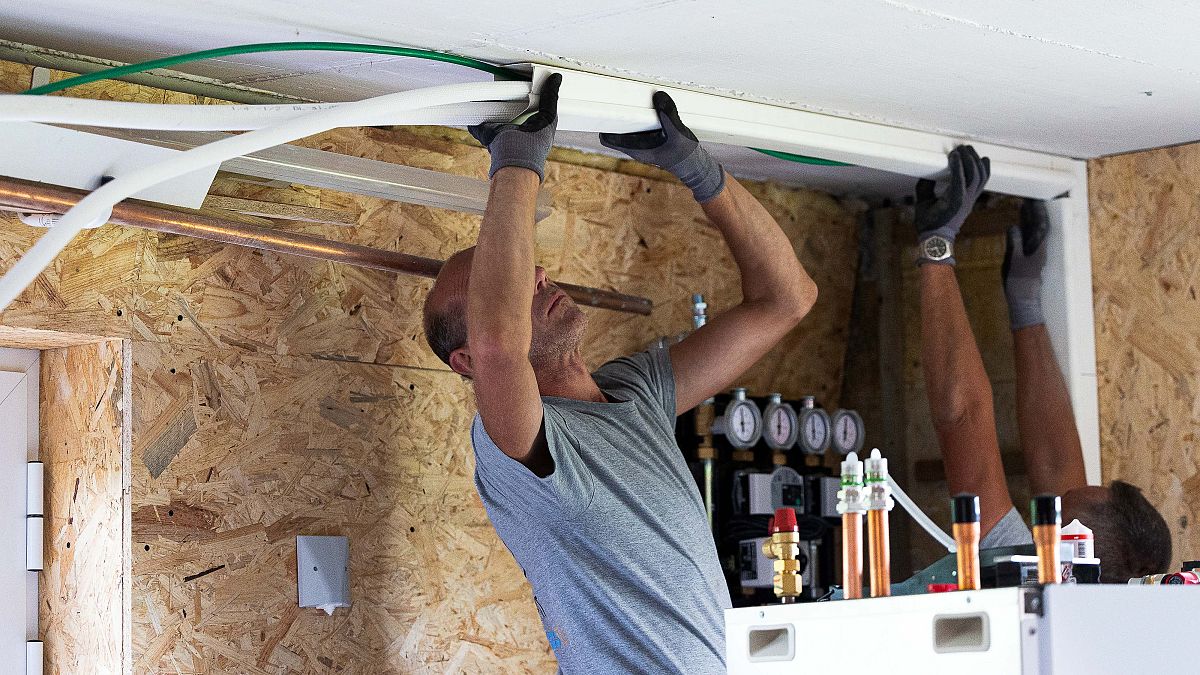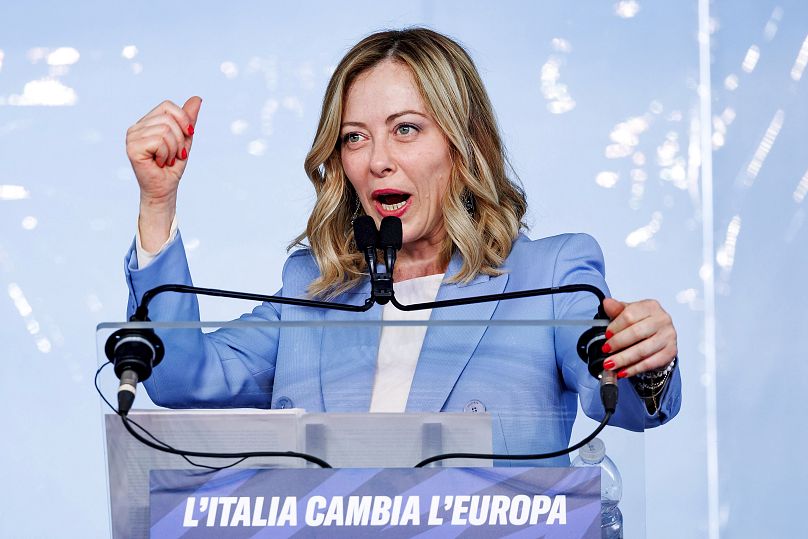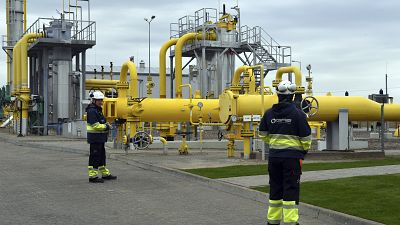The transition from fossil fuels to renewable energy was already a central pillar of the European Green Deal before a belligerent Moscow triggered an energy crisis; now the question of how best to ensure secure, affordable energy is dividing political camps as EU citizens head to the polls in June.
The recent energy crisis has partially vindicated EU decarbonisation policy: if Europe had only moved more quickly to deploy wind, solar and other renewable energy sources and reduce its dependence on fossil fuel imports, Moscow would have had a lot less leverage over western Europe as it prepared for war.
But if president Putin gambled that the EU would turn a blind eye to his 2022 invasion of Ukraine rather than do without cheap Russian gas, he must be disappointed. One of the first policy responses from Brussels after tanks rolled into its eastern neighbour was the RePowerEU plan, with raised targets for renewable energy deployment and accelerated permitting.
In fact, Moscow had been throttling gas supplies in the months preceding its invasion, but the 2022/23 winter was not as bitter as feared, and the EU surprised even itself by the rapidity with which it cut demand by almost a fifth while finding alternative sources of supply – a boon in particular for US suppliers of fracked gas.
So, while nowhere near 2022 crisis levels, gas prices still remain significantly higher than they were before Russia launched its all-out war on Ukraine – exacerbating a cost-of-living crisis that has become a central campaign issue as the EU heads for elections in June.
“From the devastating global impact of the COVID-19 pandemic to the illegal Russian invasion of Ukraine, we have seen shockwaves disrupting our economy and our societies,” Commission Vice-President Maroš Šefčovič said at an event in Paris last week.
“Not least, the energy price and cost of living crises that followed in their wake,” he said in a speech at the prestigious university Sciences Po on 24 April, during a conference on the European Green Deal that Šefčovič himself directs.
The Slovak politician noted that public acceptance for the changes that need to be made to reach the EU’s climate goals was waning. “From the recent farmer protests to the rise in support for populism cultivating a resistance to climate policies, we can see signs of wariness among our citizens,” he said. “So we must continue to cultivate the support of Europeans and European businesses for green policies,” Šefčovič said.
The European People’s Party is already the largest in the EU parliament and hoping to gain from an expected shift to the right in the forthcoming election. This could be part of a reversal of the vaunted ‘green wave’ seen in 2019, which in large part steered the European Commission, albeit under an EPP president, towards putting the Green Deal at the centre of its policy agenda.
Voter concerns around high inflation, energy prices
The centre-right group identifies high inflation, energy prices and interest rates among major concerns for voters, and promises in its election manifesto “decisive” action to tackle them. “To do this, we need a policy that is not clouded by misguided ideology but rather rests on solid factual grounds and social responsibility,” it reads.
If it has become a well-worn cliché that elections are about “the economy, stupid”, then it’s a pact that is recognised not only on the political right and Europe has much to think about. EU countries are emerging from the highest inflation rates seen since the Great Inflation of the 1970s (an episode characterised by the European Central Bank as “one of the most serious monetary policy failures of the twentieth century”).
Rocketing gas prices in Europe following Russia’s 2022 invasion of Ukraine and the closure of the main pipelines into the EU, played a significant part in the latest wave of inflation. The design of the EU’s single market for electricity arguably compounded the problem by forcing the wholesale power price to track that of gas even during periods when much of the grid was filled with renewable power from hydro, wind farms and solar arrays.
A recently agreed overhaul of energy market rules sought to put a dampener on the kind of swingeing price rises seen in 2022, when household electricity and gas prices reached record highs, although it stopped short of root-and-branch reform of the pricing mechanism.
The Party of European Socialists, who sit in the ranks of the Socialists and Democrats (S&D) in Brussels and Strasbourg, undertakes to combat energy poverty and guarantee supply to vulnerable households. From its political home in Brussels, the S&D undertakes to “strive for the reform of the energy market to guarantee price stability and affordability”.
During the energy crisis, there was a boom in sales of heat pumps, machines that draw ambient heat from the atmosphere or underground and feed it into central heating systems. But the upward sales trend went into dramatic reverse last year. Going forward, policy makers have to balance direct aid to help struggling households pay their bills with finding a way to encourage conversion from fossil fuel, usually gas, heating, and soften the hit from the substantial up-front costs.
The European Heat Pump Association represents manufacturers in Brussels. The group’s head of EU affairs Jozefien Vanbecelaere told Euronews the Commission’s RePowerEU plan had helped drive the surge in sales, setting a target of 60 million more installations by 2030. “This strong support inspired confidence in the sector which led to record sales of 3 million heat pumps in Europe in 2022,” she said.
But the Commission was supposed to present a Heat Pump Action Plan to accelerate the roll out – and that never emerged. “The plan would have been a crucial missing piece to ensure any potential barriers to faster heat pump roll-out could be addressed,” Vanbecelaere said.
Since 2022 the gas price has come back down, albeit not to pre-invasion levels. “In places like Germany there was a media backlash against national measures, and the temporary support for heat pumps came to an end in many countries,” she said, referring to Berlin’s U-turn on a plan to phase-out fossil fuel heating.
“So we would say there is definite recognition there but right now it's not being reflected in the policies and measures in place both at EU and national level,” said Vanbecelaere, whose organisation says the industry is ready to invest around €7bn up to 2025, creating an estimated 160,000 new jobs.
Tackling poverty beats climate among top voter concerns
It would up to politicians to persuade voters that public support, not just for heat pumps but the wider energy renovation of homes and buildings, is also a good idea, and would pay off in the medium- to long term. A recent survey of 26,000 EU citizens suggested that tackling poverty was top concern of voters, followed by health, jobs, defence, and then climate, all cited by between 33% and 27% of respondents.
Potentially a litmus test for the new parliament, and the Commission whose leader it will be instrumental in putting into office will be the setting of a 2040 target for net greenhouse gas reduction, a requirement under the Climate Law adopted in 2021. The current executive recently followed the advice of an independent scientific panel in recommending a cut of 90% below 1990 levels.
If that is going to test the appetite of the political class for pushing through further climate policy, then so is the job of implementing the raft of climate and environment legislation adopted under the current mandate. Among them is a new emissions trading system (ETS), due to come into operation in 2027, which will put an additional price on fossil fuels used for both heating buildings and transport. One EPP lawmaker recently warned of the risk that EU citizens, most of whom are currently unaware of the incoming policy, may well react angrily if they feel the price rises.
The right-wing European Conservatives and Reformists party, which polls suggest stand to make moderate gains and overtake the Greens in the election to become the fourth biggest group in Strasbourg assembly, has just released its election manifesto. In a statement, the group said the Green Deal should to be “turned on its head”, and that the ECR wants “a more balanced and localised climate strategy that does not forget ordinary people”.
Launching the manifesto on 24 April, Italian Prime Minister Giorgia Meloni said the group wants to end “years of forging ahead in the direction of a federalist superstate” and return power to national governments and regions. In its concise, four-page electoral pledge, the ECR pledged to “strongly advocate for a technology neutral approach that champions nuclear energy and makes us a trailblazer in geothermal power”. It is clearly sceptical about the electrification of road transport.
“We stand firm in our belief that the internal combustion engine, a testament to the power of European creativity and ingenuity, can remain commercially viable for years to come by embracing cutting-edge technology and investing in ground-breaking research on alternative low-emission fuels,” the group says.
In contrast to the Eurosceptic conservative group, the Greens’ 46-page manifesto goes into considerable detail about how the energy transition can work to the benefit of EU citizens. “Doing nothing will only serve the wealthiest profiting from fossil fuels, while leaving the poorest in our societies to bear the cost,” it runs.
Which of the conflicting messages touches the hearts and minds of voters over the next six weeks could have a dramatic impact on the direction of EU climate action and energy policy in the coming five years.




